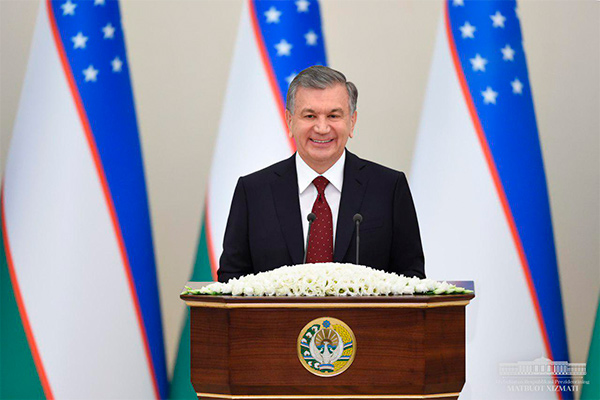
President of Uzbekistan proposes to establish a regional expert council for the rehabilitation and reintegration of radicalized citizens
Tashkent, Uzbekistan (UzDaily.com) -- On 3-4 March, Tashkent hosted a high-level international conference "Regional cooperation of the countries of Central Asia in the framework of the Joint Action Plan for the Implementation of the UN Global Counter-Terrorism Strategy".
The President of the Republic of Uzbekistan Shavkat Mirziyoyev, in his address to the conference participants, proposed to establish, under the auspices of the UN Office of Counter-Terrorism, a regional expert council from among the leading specialists of the Central Asian countries on the issues of rehabilitation and reintegration of radicalized citizens, as well as the development of proposals to combat the propaganda of terrorism in the countries of the region.
Today, the topic of repatriation from the zones of military conflicts and social rehabilitation of citizens who took part on the side of radical organizations and terrorist groups (ISIS, Hayat-Tahrir-Sham, etc.) is a topical issue that is increasingly being discussed on the agenda of the OSCE and the UN.
According to a report by the international human rights organization Human Rights Watch for 2021, about 43 thousand foreign citizens are kept in temporary refugee camps and prisons in eastern Syria (Al-Khol and Roj), controlled by Kurdish groups. More than half of those detained are Iraqis, while about 12,000 are citizens of 57 other foreign countries.
UN human rights experts have repeatedly called on countries to repatriate their citizens. The vast majority in these camps are women and children, who are held in dangerous and inhumane conditions. However, not many states responded to these calls. At the same time, the countries of Central Asia were among the first to start work on the repatriation of their citizens from the Syrian-Iraqi conflict zone. As noted in the 10-year review of the Joint Action Plan for the Implementation of the UN Global Counter-Terrorism Strategy in Central Asia, the countries of the region have become world leaders in this direction.
Since January 2019, the authorities of Kazakhstan, as a result of the humanitarian special operations Zhusan and Rusafa, have taken more than 607 of their compatriots, including 406 children, out of the zones of terrorist activity. Since May 2019, Uzbekistan has evacuated 531 of its fellow citizens from Syria, Iraq and Afghanistan, most of them women and children, as part of the Mehr humanitarian special operations. In March 2021, Kyrgyzstan returned 79 children from Iraq and Syria as part of the Meerim humanitarian mission. In April 2019, Tajikistan conducted a one-time special operation to return 84 children from Iraq to their homeland.
Conditions have been created for all returning fellow citizens in the countries of the region for their adaptation and social rehabilitation, providing them with all the necessary assistance. For example, the government of Kazakhstan has developed and is implementing a comprehensive program of "three R" (repatriation, rehabilitation and reintegration). In cooperation with NGOs, a network of rehabilitation centers has been created in the country, and about US$1 million has been allocated to support these projects. The main activity of these centers is aimed at restoring the civil status of repatriates, normalizing their physical and psychological state, providing them with individual and social opportunities for adaptation in society.
Uzbekistan has also developed and is implementing a comprehensive program for the rehabilitation and reintegration of radicalized citizens in close cooperation with civil society. Significant experience has been gained in overcoming legal and psychological difficulties in the adaptation of returnees, as well as resolving a number of legal issues to legitimize their status. At the same time, the main emphasis is placed on eliminating the causes and conditions that contributed to the accession of citizens to terrorist groups. A lot of work is being done to solve the social and domestic problems of repatriates, their employment, training in popular professions, and ensuring unhindered access to quality health care and education services. A large-scale educational religious and ideological work was organized.
In this context, it is important to emphasize that the efforts of Kazakhstan and Uzbekistan to repatriate and integrate radicalized citizens into local communities are recognized and appreciated by the world community and international organizations. As noted by the UN Special Rapporteur on human rights Finnula Ni Ilan, Uzbekistan has set an example of "effective and humane work that meets human rights standards." She stated that "the Uzbek model should become a roadmap for other governments wishing to return their citizens from conflict zones."
Although the countries of the region have already accumulated sufficient experience in solving the problems associated with the rehabilitation and resocialization of radicalized persons, this problem requires constant work in this direction. Therefore, today the issue of expanding cooperation between specialists from the countries of the region in solving emerging problems in the process of rehabilitation and reintegration of citizens is of particular importance. The novelty of the problem, the lack of generally recognized scientifically based methods and specialized specialists in this field require effective regional cooperation to achieve the goals of programs implemented in this area.
In this regard, it can be expected that the initiative of our President to establish a regional Expert Council of Specialists on the Rehabilitation and Reintegration of Radicalized Citizens will become an important platform for the exchange of information and experience on this issue, the development of joint new approaches and methods on the problems of deradicalization of repatriates, as well as effective and effective measures to combat terrorist propaganda.
Madina Aripova,
Leading Researcher,
ISMI under the President of the Republic of Uzbekistan